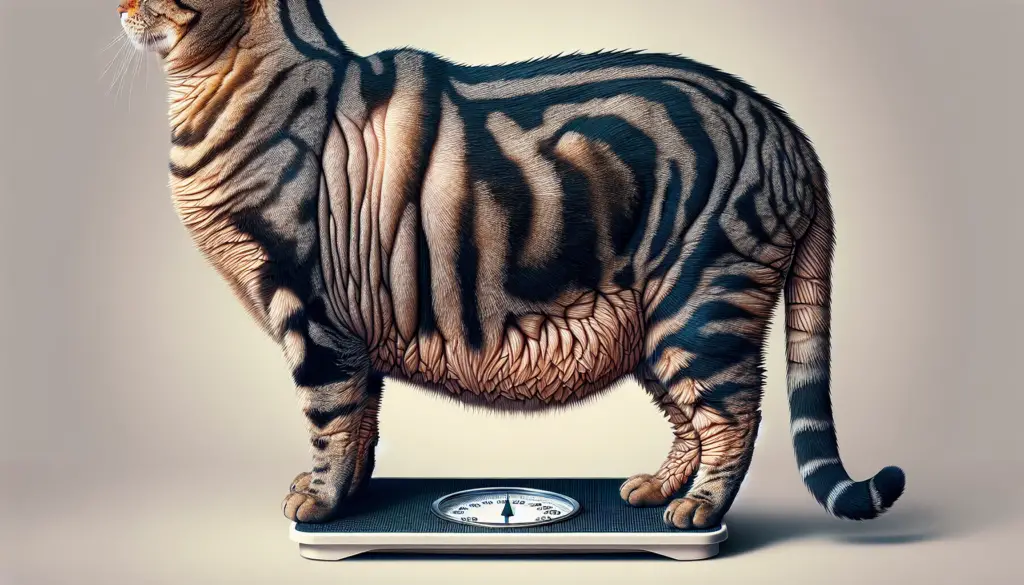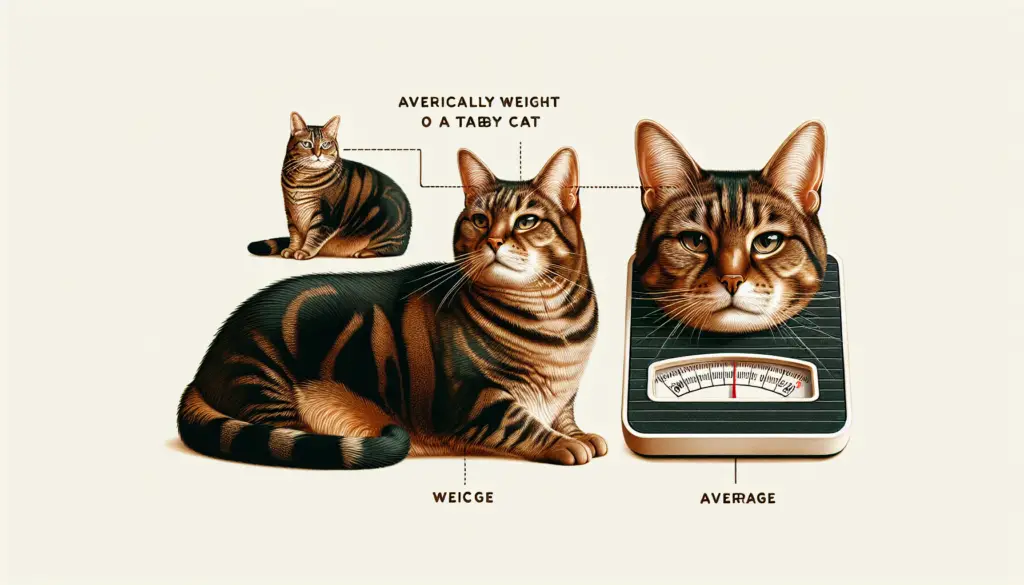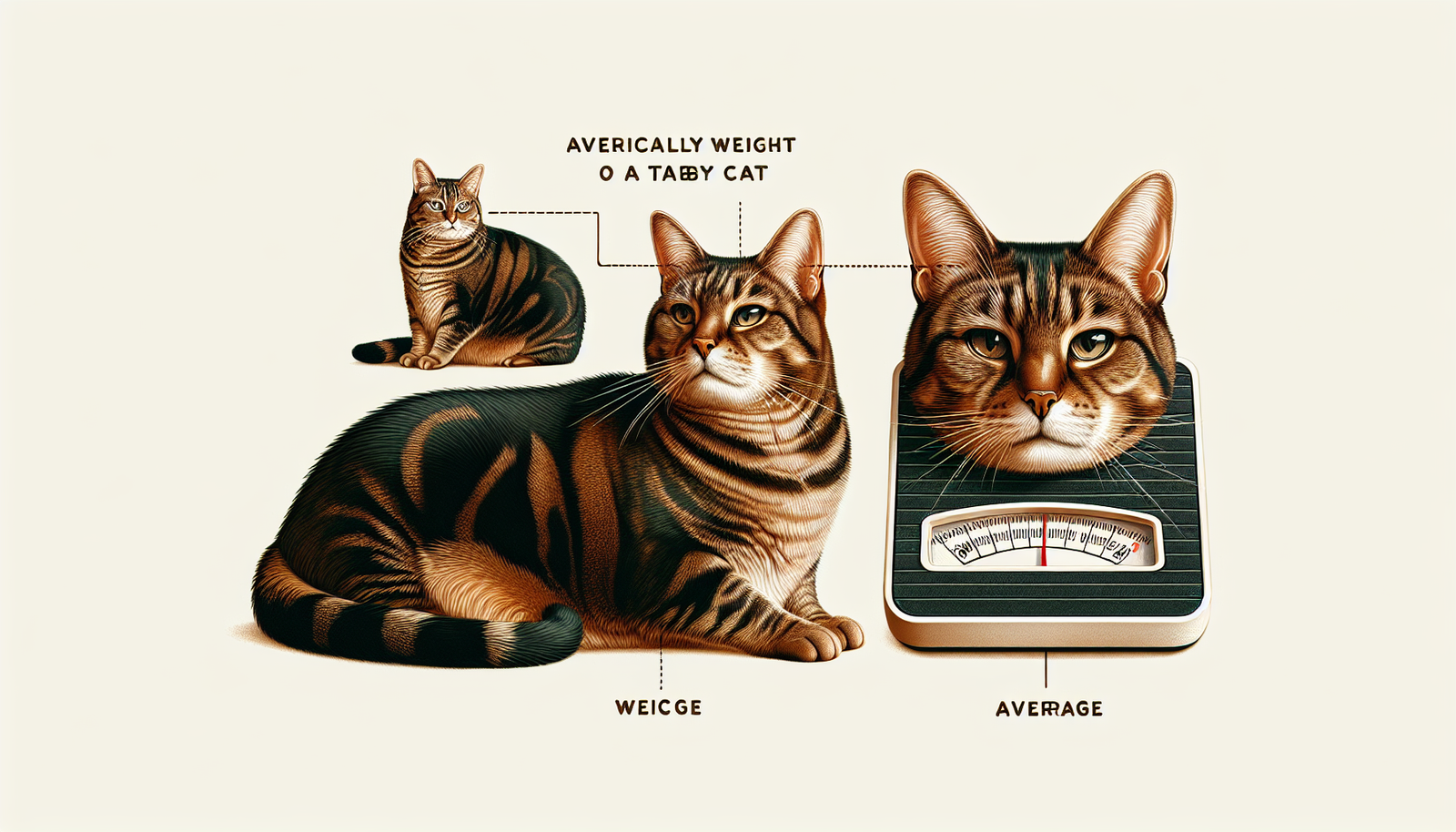Have you ever wondered how much a tabby cat weighs? Well, look no further! In this article, we will explore the average weight of tabby cats and factors that can affect their weight. Whether you’re a proud owner of a tabby cat or simply curious about these adorable feline companions, this article will provide you with all the information you need to satisfy your curiosity. So, let’s jump right in and discover the fascinating world of tabby cats and their weight!

Average Weight of a Tabby Cat
Determining Factors
The average weight of a tabby cat can vary based on several determining factors. These factors include the cat’s breed, gender, age, diet, activity level, and overall health. Each of these elements plays a significant role in shaping a tabby cat’s weight.
Range of Weight
Tabby cats, like any other feline, can fall within a broad range of weights. On average, adult tabby cats typically weigh between 7 and 15 pounds (3 to 7 kilograms). However, there can be variations within this range due to different influencing factors.
Gender Differences
In general, male tabby cats tend to be slightly larger and heavier than their female counterparts. Male tabbies can weigh between 9 and 15 pounds (4 to 7 kilograms), while females usually weigh between 7 and 12 pounds (3 to 5 kilograms). It’s important to note that these weights are averages, and individual cats may fall outside of this range.
Factors Affecting Weight Variations
Several factors can contribute to weight variations in tabby cats. These factors include breed variation, age and growth phases, diet and nutrition, activity level, and overall health. Understanding these factors can help cat owners better manage and maintain their tabby cat’s weight.
Healthy Weight for Tabby Cats
Importance of Maintaining a Healthy Weight
Maintaining a healthy weight is crucial for the overall well-being of a tabby cat. An optimal weight helps to reduce the risk of various health problems and ensures a longer and happier life for your furry friend. Cats that are overweight or underweight may experience numerous health issues that can impact their quality of life.
Ideal Weight Range
The ideal weight range for a tabby cat depends on various factors. As mentioned earlier, adult tabby cats generally weigh between 7 and 15 pounds (3 to 7 kilograms). However, it’s important to consider the specific characteristics and needs of your individual cat, as some may naturally fall outside of this range while still being healthy.
Weight-Related Health Issues
Both obesity and underweight can lead to significant health problems in tabby cats. Obesity is linked to increased risks of diabetes, heart disease, joint problems, and overall decreased mobility. On the other hand, underweight cats may experience a weakened immune system, malnutrition, and decreased energy levels.
Keeping Your Tabby Cat at a Healthy Weight
To maintain an optimal weight for your tabby cat, it’s essential to provide a balanced diet, portion control, regular exercise, and monitoring of their weight. Ensuring that your cat receives appropriate nutrition and engaging in physical activity will help keep them fit and prevent weight-related health issues.
Factors Influencing a Tabby Cat’s Weight
Breed Variation
Tabby cats come in various breeds, and each breed may have its own average weight range. For example, Maine Coon tabbies tend to be larger and heavier than domestic shorthair tabbies. It’s crucial to consider the specific breed characteristics when evaluating a tabby cat’s weight.
Age and Growth Phases
A tabby cat’s weight can also vary based on their age and growth phase. Kittens typically have a lower weight compared to adult cats. As they grow, their weight increases rapidly until they reach their adult size. Older tabby cats may experience weight fluctuations due to natural aging processes and changes in metabolism.
Diet and Nutrition
Diet and nutrition play a vital role in determining a tabby cat’s weight. Providing a balanced diet that meets their nutritional needs is essential for maintaining a healthy weight. High-quality cat food, appropriate portion sizes, and avoiding excessive treats or human food can help control their weight.
Activity Level
The activity level of a tabby cat can influence their weight. Cats with higher activity levels, such as those with access to outdoor spaces or engaged in interactive playtime, may have a leaner body mass compared to less active cats. Encouraging regular exercise and playtime can help manage their weight effectively.
Overall Health
The overall health of a tabby cat can impact their weight. Certain health conditions, such as thyroid disorders or gastrointestinal issues, can lead to weight gain or loss. Regular veterinary check-ups and monitoring their overall health can help address any potential weight-related concerns.
Weighing a Tabby Cat
Weighing Methods
Accurately weighing a tabby cat is essential for monitoring their weight over time. There are several methods to weigh a cat, including using a pet scale, determining body condition score, or visiting a veterinarian.
Using a Pet Scale
A pet scale is a reliable method to measure a tabby cat’s weight at home. Place the cat on the scale, ensuring they are calm and comfortable, and record the weight displayed by the scale. Regularly weighing your tabby cat can help you track any weight changes and detect potential health issues early on.
Determining Body Condition Score
The body condition score (BCS) is a visual and tactile assessment to evaluate a cat’s weight. Using a designated scale, you can determine if your tabby cat falls within the ideal weight range by analyzing their body shape, fat distribution, and muscle mass. Veterinarians often use this method during routine check-ups.
Visiting a Veterinarian
If you are uncertain about weighing your tabby cat accurately or have concerns about their weight, it’s always best to consult a veterinarian. They have the expertise and tools to measure your cat’s weight accurately and provide guidance on maintaining a healthy weight.

Frequently Asked Questions about Tabby Cat Weight
What is the average weight of a domestic tabby cat?
The average weight of a domestic tabby cat ranges from 7 to 15 pounds (3 to 7 kilograms), depending on various factors such as breed, gender, and overall health.
How much does a tabby kitten weigh?
Tabby kittens generally weigh much less than adult tabby cats. Their weight can range from a few ounces to about 2 pounds (1 kilogram), depending on their age and breed.
Do male and female tabby cats weigh the same?
Male and female tabby cats do not weigh the same on average. Male tabbies tend to be slightly larger and heavier, weighing between 9 and 15 pounds (4 to 7 kilograms), while females typically weigh between 7 and 12 pounds (3 to 5 kilograms).
How often should I weigh my tabby cat?
It is recommended to weigh your tabby cat regularly, especially during their growth phase or if you have concerns about their weight. Monthly weigh-ins can provide a useful tracking tool, but consult your veterinarian for personalized advice regarding the frequency of weighing.
Can a tabby cat be overweight?
Yes, tabby cats can become overweight if they consume excessive calories and lack physical activity. Obesity in cats can lead to various health problems, so it’s crucial to monitor their weight and ensure they maintain a healthy body condition.
Maintaining a Healthy Weight for Your Tabby Cat
Balanced Diet and Portion Control
Feeding your tabby cat a balanced diet is essential to maintain their weight. Choose high-quality cat food that suits their nutritional needs and follow the recommended portion sizes. Avoid overfeeding or leaving food out for free feeding.
Regular Exercise and Playtime
Promoting regular exercise and playtime can help your tabby cat stay active and burn calories. Engage in interactive play sessions using toys or create an engaging environment that encourages climbing and exploration. Physical activity is beneficial for weight management and overall well-being.
Avoiding Overfeeding and Treats
Overfeeding and excessive treats can quickly contribute to weight gain in cats. Use treats sparingly and consider low-calorie options. Avoid giving them human food, as it may be high in calories and lack the essential nutrients cats need.
Frequent Monitoring and Vet Visits
Regularly monitor your tabby cat’s weight through weigh-ins and body condition score assessments. If you notice significant weight changes or have concerns about their weight, consult your veterinarian. They can provide guidance, make necessary adjustments to their diet or exercise routine, and address any potential health issues.
Understanding Weight-Related Health Issues
Obesity and its Consequences
Obesity is a common weight-related health issue in tabby cats, and it can have severe consequences. Besides the strain on joints and decreased mobility, obesity increases the risk of diabetes, heart disease, liver problems, and urinary issues. Maintaining a healthy weight is vital to prevent these complications.
Underweight Concerns
Underweight tabby cats may face health concerns as well. A weakened immune system, malnutrition, and decreased energy levels are common problems associated with being underweight. Identifying the underlying causes and addressing them with proper nutrition and veterinary care is crucial.
Other Weight-Related Health Problems
Weight-related health problems in tabby cats extend beyond obesity and underweight. Conditions such as arthritis, joint disorders, and respiratory issues can be aggravated by excess weight. Monitoring your cat’s weight and addressing any health concerns promptly can help alleviate these issues.
Special Considerations for Senior Tabby Cats
Age-Related Weight Changes
Senior tabby cats may experience age-related weight changes. Some may naturally lose muscle mass and gain fat, while others may have difficulty maintaining a healthy weight due to underlying health issues. Regular monitoring, adjustment of diet and exercise routines, and veterinary check-ups are crucial during this stage.
Specific Nutritional Needs
Senior tabby cats have specific nutritional needs that differ from younger cats. They may benefit from senior cat food formulas designed to support their aging bodies. These formulas typically provide optimal nutrient balance and promote weight maintenance in older cats.
Monitoring Weight and Health
For senior tabby cats, monitoring both their weight and overall health is essential. Regular weigh-ins, body condition scoring, and veterinary check-ups can help detect any weight-related issues or underlying health conditions early on. This proactive approach allows for timely intervention and targeted care.
Breed-Specific Weight Variation in Tabby Cats
Different Tabby Cat Breeds
Tabby cats come in various breeds, and weight variations can be seen across these different breeds. Maine Coon tabbies, for instance, are known for their larger size and heavier weight compared to other domestic shorthair tabbies. Recognizing these breed-specific differences is essential when considering the weight of a tabby cat.
Weight Range Comparison
The weight range for different tabby cat breeds can vary significantly. While most domestic tabbies weigh between 7 and 15 pounds (3 to 7 kilograms), specific breeds may fall outside of this range. It’s important to research and understand the typical weight range for the specific tabby breed you have to ensure their weight is within a healthy range.
Conclusion
The average weight of a tabby cat can range from 7 to 15 pounds (3 to 7 kilograms), depending on various factors such as breed, gender, age, diet, and overall health. Maintaining a healthy weight is essential for your tabby cat’s overall well-being and can help prevent weight-related health issues. Regular monitoring, a balanced diet, portion control, regular exercise, and veterinary visits are essential components of maintaining a healthy weight for your tabby cat. By understanding the factors influencing their weight, addressing weight-related health concerns, and considering specific needs based on their age and breed, you can ensure that your tabby cat remains happy, healthy, and at an optimal weight throughout their life.

